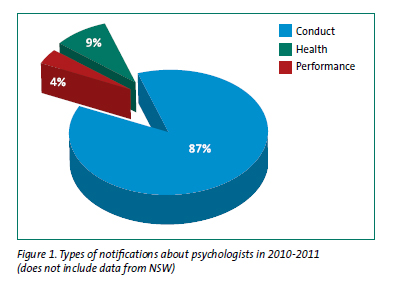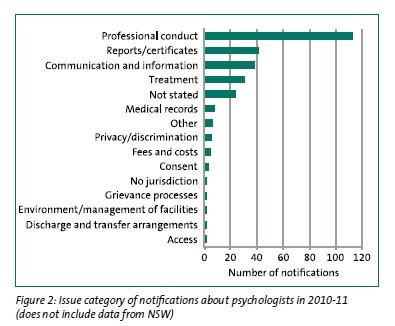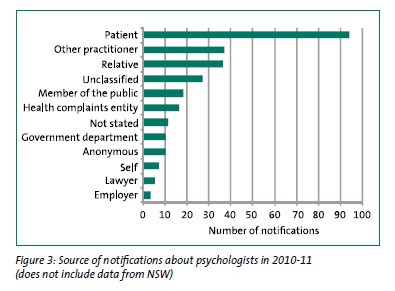Three new public safety requirements for registered health professionals (including psychologists) were introduced under the National Registration and Accreditation Scheme (NRAS) in 2010. These requirements are designed to protect the public from being placed at harm and involve: criminal record checks on initial registration, during registration and on renewal of registration; a system for notifications (complaints) about the conduct, health and performance of practitioners; and mandatory notification (complaints) by practitioners about other health practitioner’s conduct.
National data on the outcomes of these new requirements in the first year of operation of the NRAS for 530,115 registered health professionals, including 29,142 registered psychologists, were published in the 2010-11 Annual Report of the Australian Health Practitioner Regulation Agency (AHPRA). The data indicate that a small number of psychologists came to the attention of the national regulator during the first year of national registration.
Criminal record checks
The Psychology Board of Australia (PsyBA) now has the right to obtain a written report from CrimTrac (the national information-sharing service that records criminal histories) when a psychologist applies for registration, during registration or on renewal of registration. All psychologists have ongoing personal reporting obligations to the PsyBA if they have been charged with an offence punishable by imprisonment, and on application for renewal of registration psychologists are also asked to complete an annual statement including declarations of criminal charges or withdrawal of practice rights.
Criminal record checking of health professionals occurred nationally in 2010-11 for the first time since the introduction of national registration. In 2010-11 AHPRA requested 52,445 criminal record checks of health professional applicants, 2,992 (6%) of which indicated the applicant had a criminal history and 449 (15%) were assessed as having the potential to affect registration. Forty of these 449 checks on health professional applicants resulted in action on their applications for registration, with one application for registration as a psychologist being refused, two psychologists having conditions imposed on registration, and two applications for registration as a psychologist being withdrawn.
Notifications on the conduct, health and performance of psychologists
The PsyBA is responsible for overseeing investigations about the conduct, health and performance of Australia’s registered psychologists. Notifications are dealt with through formal delegations from AHPRA State and Territory offices, except in NSW where notifications are dealt with by separate health professional councils and the Health Care Complaints Commission. Grounds for notifications include concern about a psychologist's professional conduct, concern about a psychologist’s knowledge, skill or judgement, and the possibility that a psychologist may have an impairment affecting the ability to practise. The PsyBA may seek further evidence or require that the practitioner undergo a health assessment or a performance assessment, depending on the basis of the notification.
From 1 July 2010 to 30 June 2011, notifications were received about 390 psychologists nationally, representing 1.2 per cent of the total number of registered psychologists. The data for all registered health practitioners indicated that dental practitioners recorded the highest proportion of notifications in 2010-11 relative to the number of registered dental practitioners (5.8%).
AHPRA categorises all notifications into conduct, health or performance and has also developed a classification system to reflect the issues of concern which prompt a notification about a practitioner. The types of notifications made about psychologists and the issues of concern prompting a notification are presented in Figure 1 and Figure 2. Consistent with previous experience under State and Territory registration, most notifications related to psychologists’ professional conduct.


The majority of notifications about psychologists were made by the clients (patients) of psychologists, followed by those made by other practitioners and clients' relatives, as presented in Figure 3.

Mandatory notification by practitioners about other registered health practitioners
Under the NRAS, there is an obligation on any registered health practitioner or employer who forms a reasonable belief that another practitioner has engaged in notifiable conduct, to make a report to AHPRA. ‘Notifiable conduct’ is defined as when a practitioner has: practised whilst intoxicated by alcohol or drugs; engaged in sexual misconduct in connection with the practice of the profession; placed the public at risk of substantial harm during practice because of an impairment; or practised outside accepted professional standards thereby placing the public at risk.
In 2010-11 AHPRA received 428 mandatory notifications. More that 90 per cent of the mandatory notifications related to nurses (58%) or medical practitioners (34%), with nine (2%) received about psychologists. The grounds for nearly 60 per cent of mandatory notifications were a concern that the practitioner was placing the public at risk due to practice that constituted a significant departure from accepted professional standards.
Of the 428 mandatory notifications, immediate action was taken in 74 cases with three of these involving psychologists. The outcome of this immediate action was the suspension of registration of all three psychologists.
APS advocacy
The APS is seeking clarification from the PsyBA in relation to several matters concerning investigations, as an increasing number of calls are being received from members who have been contacted by AHPRA regarding a ‘notification’. Of concern is the level of qualifications and experience of assessors of investigations given the sensitive nature of the work, and the necessity to ensure that confidential practitioner and client information is protected. Another concern which remains to be clarified is how the PsyBA will ensure that the investigative process meets the principles of natural justice for practitioners. The APS will continue to follow these matters closely as the national scheme is further bedded down.
The APS recommends that members who become the subject of a notification should take the following steps.
- Insist on specific information about the notification in order to receive a satisfactory rejoinder, i.e., what, to who and when
- Contact your professional indemnity insurer to access legal representation. It is part of the professional indemnity insurance policy requirement to inform your insurer regarding any event which may lead to a claim.
- Through the insurer, seek legal advice in formulating a response.
Where psychologists are required to provide information to an investigator as the result of a complaint it is recommended that confidential client information is sealed in an envelope marked ‘Confidential information to be reviewed by a psychologist only’. Members should be aware that they are protected from legal or ethical prosecution for breach of confidentiality pursuant to section 237 of the National Law if required to provide information to an AHPRA investigator.
The full AHPRA 2010-11 Annual Report can be accessed from
www.ahpra.gov.au/News/2011-11-1-AHPRA-annual-report-released.aspx
| APS ETHICS RESOURCES |
|
Psychological practice frequently presents complex professional and ethical dilemmas. The APS has a range of resources available to members to assist with these types of concerns.
- APS Code of Ethics and Ethical Guidelines
The APS Code is principle-based and is complemented by 23 different Ethical Guidelines to assist psychologists practising in various contexts and with various client groups. These are available to members online (https://www.psychology.org.au/for-members/Resource-Finder/Resources/Ethics) or can be purchased from the National Office
- Professional Advisory Service (PAS)
Experienced psychologists at the APS National Office are available to assist members with specific professional and ethical matters that require careful consideration. Members can access this service by calling the National Office on (03) 8662 3300 or toll free 1800 333 497 or by emailing [email protected]
- Aon legal hotline
Members who hold professional indemnity insurance with Aon, the APS-endorsed insurance facility, can access up to two hours of legal advice each year through a legal hotline for any legal issues related to their psychological practice. The legal advice is now provided by State-based legal firms.
|